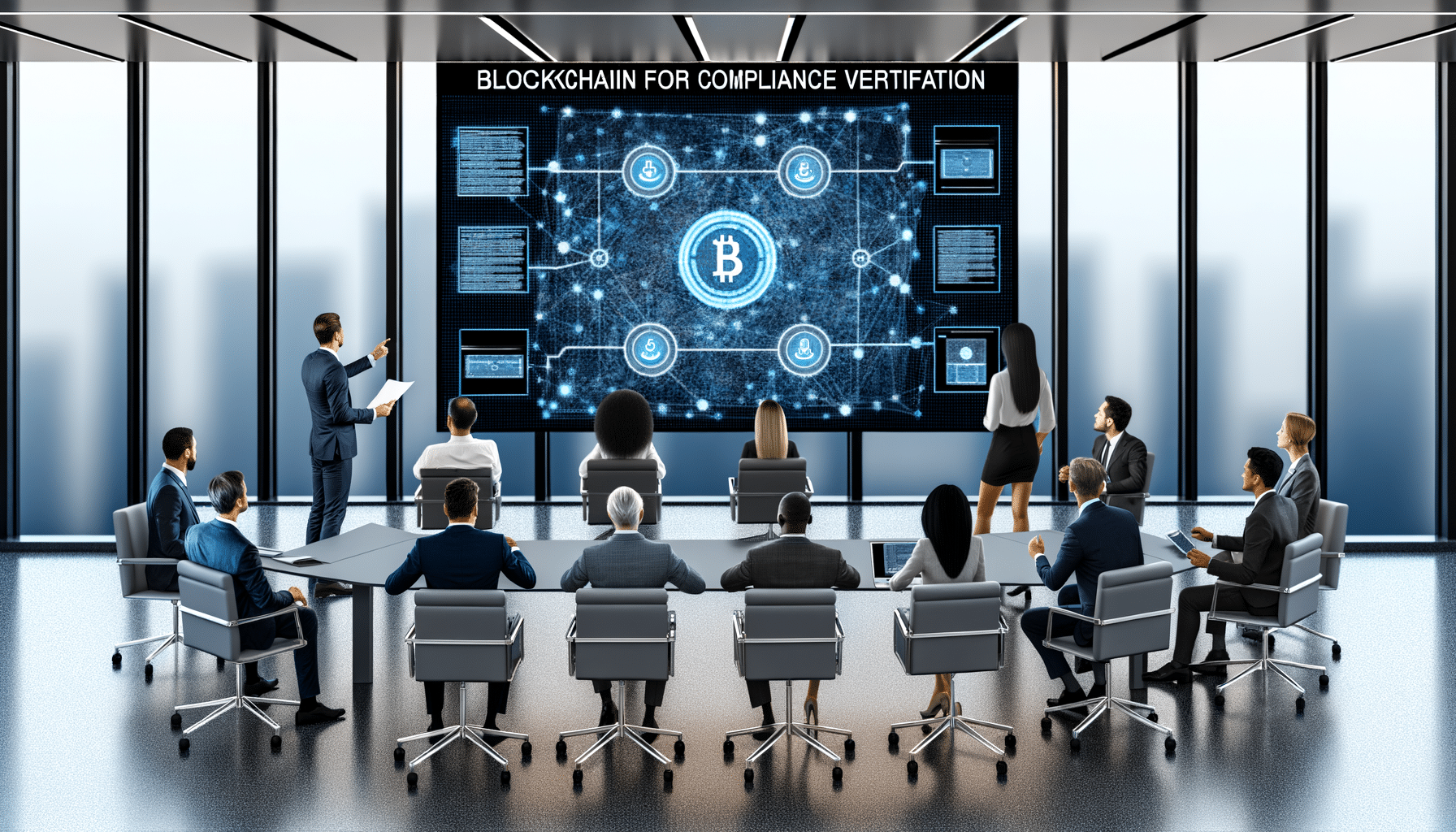- Audit Verification
- November 16, 2024
Blockchain for Compliance Verification

In today’s rapidly evolving digital landscape, the quest for reliable and efficient compliance verification is more pressing than ever. As organizations strive to meet stringent regulatory requirements, traditional processes are often found lacking—being either slow, costly, or prone to errors. This is where blockchain technology steps in, offering an innovative solution that could redefine how we approach compliance.
Why Compliance Verification Matters
Organizations across various sectors, including finance, healthcare, and government, face an uphill task ensuring compliance with numerous regulations such as GDPR, HIPAA, and SOX. The repercussions of non-compliance can be severe, from hefty fines to damaged reputations. Therefore, companies look for robust ways to verify their compliance efforts.
The Role of Blockchain in Compliance Verification
Blockchain technology presents a transformative approach to compliance verification. By leveraging its core attributes of immutability, transparency, and security, blockchain can streamline and safeguard compliance processes:
- Immutable Records: Data stored on a blockchain is tamper-proof, ensuring the integrity of compliance records. This allows for confident verification of compliance activities, knowing the records are unchanged.
- Enhanced Transparency: Blockchain enables transparent documentation of all compliance-related actions, easily traceable and verifiable by authorized parties. This fosters trust among stakeholders and eases audit processes.
- Secure Data Sharing: With controlled access permission, sensitive compliance data can be shared securely across various entities, improving collaboration while preserving confidentiality.
Blockchain Integration with Compliance Procedures
I developed RecordsKeeper.AI with the vision of integrating blockchain into compliance procedures seamlessly. Here’s how it works:
Automated Workflow Management
The automation capabilities of blockchain streamline compliance procedures, minimizing human intervention and reducing the potential for error. Smart contracts automate compliance checks, making the entire process more efficient and consistent.
Audit-ready Reporting
The blockchain’s ability to store immutable logs supports meticulously detailed audit trails. These logs facilitate quick and accurate preparation of compliance reports, significantly simplifying the audit process and providing peace of mind to compliance officers.
Continual Compliance Monitoring
Continuous data processing on the blockchain allows for real-time monitoring and notification of compliance statuses. Organizations can proactively address potential compliance breaches before they become significant issues.
Benefits of Using Blockchain for Compliance
The integration of blockchain into compliance verification processes offers several key benefits:
- Cost Efficiency: While traditional compliance verification can be resource-intensive, blockchain reduces costs by automating processes and eliminating redundancy.
- Improved Accuracy: By maintaining precise records and eliminating manual errors, blockchain enhances the accuracy of compliance data.
- Enhanced Trust: Trust among stakeholders is increased with transparent, verifiable compliance practices that blockchain provides.
Real-World Applications and Case Studies
Several industries are already exploring blockchain for compliance:
- Financial Services: Blockchain offers a secure method for Know Your Customer (KYC) verification, saving time and resources in customer onboarding processes while ensuring compliance.
- Healthcare: Blockchain securely handles medical records, ensuring compliance with privacy regulations and seamless sharing across providers.
- Supply Chain: Organizations verify sustainable practices and supply chain integrity through blockchain-ledgers, complying with environmental standards.
Future Prospects
As more industries realize the potential of blockchain for compliance verification, its adoption is bound to increase. Blockchain could become a core element of compliance strategy, providing a reliable and efficient alternative to traditional methods.
Conclusion
Compliance verification is essential for businesses and industries operating in a heavily regulated environment. Blockchain technology’s unique features offer a new avenue for organizations to streamline processes and maintain compliance with minimal hassle. At RecordsKeeper.AI, I have seen firsthand the potential of blockchain to transform record-keeping and compliance management. As we move forward in this digital age, embracing innovative technologies like blockchain can ensure we stay ahead in our compliance efforts.
I encourage you to explore blockchain-based compliance solutions and follow RecordsKeeper.AI’s journey to revolutionize compliance management. For more insights and updates, stay connected with me. Let’s drive innovation together.
Toshendra Sharma is the visionary founder and CEO of RecordsKeeper.AI, spearheading the fusion of AI and blockchain to redefine enterprise record management. With a groundbreaking approach to solving complex business challenges, Toshendra combines deep expertise in blockchain and artificial intelligence with an acute understanding of enterprise compliance and security needs.
Related Posts

The Role of Blockchain in Audit Verification for Financial Records
Understand how blockchain facilitates audit verification.
- March 3, 2024
Archives
- December 2024
- November 2024
- October 2024
- September 2024
- August 2024
- July 2024
- June 2024
- May 2024
- April 2024
- March 2024
- February 2024
- January 2024
- December 2023
- November 2023
- October 2023
- September 2023
- August 2023
- July 2023
- June 2023
- May 2023
- April 2023
- March 2023
- February 2023
- January 2023
- December 2022
- November 2022
- October 2022
- September 2022
- March 2019
Want to get more content like this?
Signup to directly get this type of content to your inbox!!
Latest Post
Organizing External Auditor Access
- December 22, 2024
Document Control in Manufacturing Plants
- December 21, 2024
Handling Rush Financial Report Requests
- December 20, 2024
Managing Record Access After Staff Changes
- December 19, 2024





